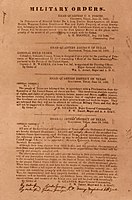
Juneteenth
Juneteenth (officially Juneteenth National Independence Day) is a federal holiday in the United States commemorating the ending of slavery in the United States. Its name is a portmanteau of the words "June" and "nineteenth", as it is celebrated on the anniversary of June 19, 1865, when Major General Gordon Granger ordered the final enforcement of the Emancipation Proclamation in Texas at the end of the American Civil War.[8][9] Originating in Galveston, Juneteenth has since been observed annually in various parts of the United States, often broadly celebrating African-American culture.
For other uses, see Juneteenth (disambiguation).Juneteenth
United States
Emancipation of enslaved people in the United States
Festivals, parties, parades, church services
African-American history, culture, and progress
June 19[a]
Annually
- June 19, 1866 (celebration)
- June 19, 2021 (federal holiday)[b]
Early celebrations were held by Christian churches and the Freedmen's Bureau
Early celebrations date back to 1866, at first involving church-centered community gatherings in Texas. They spread across the South and became more commercialized in the 1920s and 1930s, often centering on a food festival. Participants in the Great Migration brought these celebrations to the rest of the country. During the Civil Rights Movement of the 1960s, these celebrations were eclipsed by the nonviolent determination to achieve civil rights, but grew in popularity again in the 1970s with a focus on African-American freedom and African-American arts. Beginning with Texas by proclamation in 1938, and by legislation in 1979, every U.S. state and the District of Columbia has formally recognized the holiday in some way.
Juneteenth is also celebrated by the Mascogos, descendants of Black Seminoles who escaped from slavery in 1852 and settled in Coahuila, Mexico.[10]
The day was recognized as a federal holiday in 2021, when President Joe Biden signed the Juneteenth National Independence Day Act into law. Juneteenth became the first new federal holiday since Martin Luther King Jr. Day was adopted in 1983.[11]
Long title
An Act to amend title 5, United States Code, to designate Juneteenth National Independence Day as a legal public holiday.
June 17, 2021

